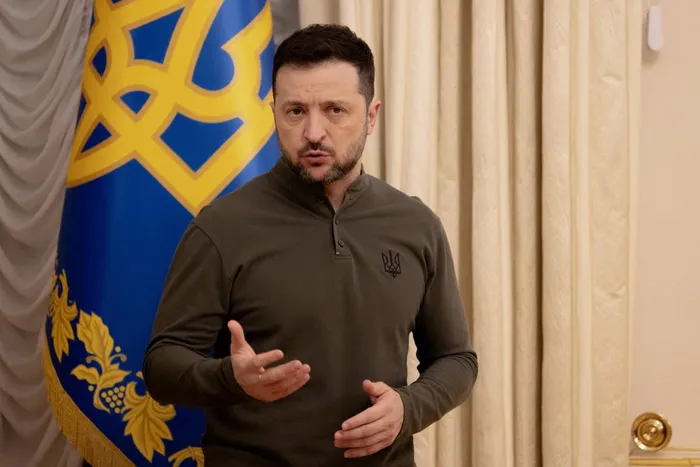South Africa considers bolstering agricultural trade with Ukraine ahead of Zelenskyy's visit
AGRICULTURE

There have been calls for South Africa to strengthen economic ties with Ukraine, especially in the agriculture sector. This comes as Ukraine President Volodymyr Zelenskyy is expected to be in the country on Thursday to meet with President Cyril Ramaphosa.
Image: Tetiana DZHAFAROVA / AFP
Calls for South Africa to deepen its economic engagement with Ukraine are gaining traction ahead of an anticipated visit from Ukrainian President Volodymyr Zelenskyy on Thursday.
This visit represents a significant opportunity for both nations, particularly in the agricultural sector, where experts see potential for long-term mutually beneficial trade relationships.
Wandile Sihlobo, the chief economist of the Agricultural Business Chamber of South Africa (Agbiz), said on Tuesday that the leadership discussions will likely revolve around key geopolitical issues, given Ukraine's ongoing conflict.
However, Sihlobo emphasised that informal business talks are already underway, setting the stage for possible partnerships.
"The Ukrainian President may visit South Africa, accompanied by senior government officials from the economic sector. Such conversations may be about forming connections to support Ukraine as it navigates the war and explores long-term business opportunities in the post-war world, whenever that day comes," Sihlobo said.
Both Ukraine and South Africa are net exporters of agricultural products. Ukraine’s agricultural exports are approximately $21 billion (R391bn) per year.
These exports are mainly sunflower oil, maize, wheat, canola, soybeans, poultry products, barley, and sugar, among other products. China, India, the Netherlands, Egypt, Turkey, Spain, Poland, Germany, Indonesia, Italy, and Saudi Arabia are among Ukraine’s key agricultural export markets.
Despite these figures, there is room for strategic collaboration. South Africa imports about half of its annual wheat consumption, translating to approximately 1.8 million tons.
"There is room for a deeper conversation about how South Africa could import more wheat from Ukraine, provided the quality and price are acceptable to private businesses," said Sihlobo.
"Ukraine is not a prominent key wheat supplier in South Africa. Currently, Ukraine is not a key supplier in this realm, although conditions could be ripe for a larger exchange of goods if pricing and quality align with market needs."
In the 2024-25 marketing year alone, South Africa imported 904 344 tons of wheat by the start of April, illustrating its dependence on foreign wheat supplies.
Andre Thomashausen, Professor Emeritus for International Law at the University of South Africa (Unisa), expressed criticism of the country's engagement with Ukraine at a time when its relationships with major powers like the United States and the European Union awere strained.
"The G20 Summit in Johannesburg in 2025 will be shunned by the US and Russia and therefore probably also India and China. To now cosy up to Zelensky is a costly act of attention seeking. Zelensky has just now again postponed elections in his country," he said.
"All fundamental human rights that South Africa cherishes are suspended in Ukraine. South Africa can ill afford to back another losing cause."
However, Francois Rossouw, CEO of Southern African Agri Initiative (Saai), said that there was definitely long-term potential for greater collaboration between South Africa and Ukraine in the agricultural sector.
"While both countries are net exporters of agricultural products, we must be strategic in identifying complementary opportunities. From a South African perspective, importing high-quality wheat at competitive prices is one such opportunity," Rossouw said.
"We currently import almost half of our annual wheat consumption, close to 1.8 million tonnes, and Ukraine’s grain quality and logistics capacity make it a potential supplier that could strengthen our food security.
Rossouw added that beyond grain, there was also untapped potential in fertilizer trade.
"Ukraine is a significant global exporter of nitrogenous, phosphatic, and potassic fertilizers. A mutually beneficial trade agreement could help improve affordability and accessibility of fertilizers for South African farmers, especially smaller-scale producers who struggle with input costs."
BUSINESS REPORT